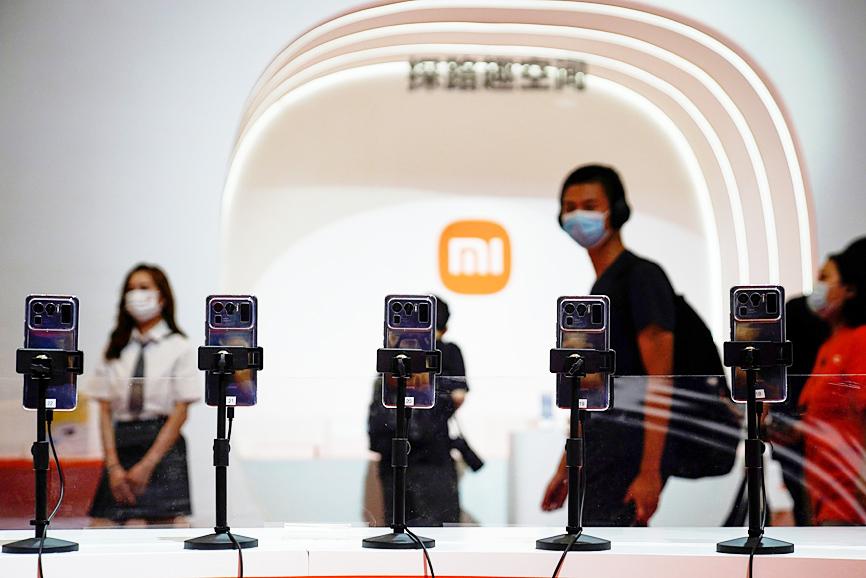Xiaomi Corp (小米) is planning to buy autonomous driving technology start-up Deepmotion for about US$77.4 million, sealing a deal to help further its ambitions of getting into the fast-expanding field.
The company announced the acquisition after reporting better-than-expected results for the second quarter, when a recovery in key markets like India helped it overtake Apple Inc to become the world’s second-largest smartphone vendor by shipments.
Revenue surged 64 percent to 87.79 billion yuan (US$13.5 billion) last quarter, surpassing the 85.01 billion yuan average of estimates.

Photo: Reuters
Xiaomi CEO Lei Jun (雷軍) is spearheading a drive to take the firm beyond smartphones.
The 51-year-old is personally leading a project to make electric vehicles (EVs), and the company has pledged an initial investment of US$10 billion over the next decade in the business.
Lei has said that the company has deep enough pockets to fund such a project, which requires years of heavy investment in development and manufacturing before the first vehicle can even be sold.
Xiaomi’s shares yesterday slid as much as 4.7 percent, their biggest intraday fall in a month, after investors again punished Chinese tech stocks.
The stock was weighed down also by lingering concerns about Xiaomi’s growing outlay on EVs.
“Xiaomi’s results were very strong so the reaction appears to be just broader tech weakness,” Bloomberg Intelligence analyst Matthew Kanterman said. “Some concern remains about the degree of investment into Xiaomi’s smart vehicle business, but these are longer-term initiatives and not impacting near-term results.”
The acquisition of Deepmotion, which develops driver assistance software, is the latest in a series of moves Xiaomi is making to delve deeper into a crowded field.
A number of tech giants from Huawei Technologies Co (華為) to Baidu Inc (百度) have already spent years developing components and vehicle technologies.
Xiaomi president Wang Xiang (王翔) on Wednesday said that the purchase is intended to help the firm develop level 4 self-driving technology, which allows full autonomous driving.
“Through this acquisition, we hope to shorten the time to market for our product,” Wang told reporters after releasing results. “We want to speed up our autonomous driving R&D [research and development].”
While other details about Xiaomi’s EV efforts remain unclear, it has initiated a hiring spree of 500 engineers for the project, and has talked to multiple automakers and local authorities for potential partnerships.
The company has also looked at investing in Black Sesame Technologies, a start-up that develops artificial intelligence chips and systems for vehicles.
On Wednesday, Xiaomi reported that net income climbed more than 80 percent to 8.27 billion yuan last quarter, sezing the No. 2 position globally for the first time, in part after shipments in India almost doubled from a year earlier.
Lei this month set his sights on reaching the top spot within three years, taking advantage of the waning fortunes of local rival Huawei, whose capacity has been hobbled by US sanctions.

In Italy’s storied gold-making hubs, jewelers are reworking their designs to trim gold content as they race to blunt the effect of record prices and appeal to shoppers watching their budgets. Gold prices hit a record high on Thursday, surging near US$5,600 an ounce, more than double a year ago as geopolitical concerns and jitters over trade pushed investors toward the safe-haven asset. The rally is putting undue pressure on small artisans as they face mounting demands from customers, including international brands, to produce cheaper items, from signature pieces to wedding rings, according to interviews with four independent jewelers in Italy’s main

Japanese Prime Minister Sanae Takaichi has talked up the benefits of a weaker yen in a campaign speech, adopting a tone at odds with her finance ministry, which has refused to rule out any options to counter excessive foreign exchange volatility. Takaichi later softened her stance, saying she did not have a preference for the yen’s direction. “People say the weak yen is bad right now, but for export industries, it’s a major opportunity,” Takaichi said on Saturday at a rally for Liberal Democratic Party candidate Daishiro Yamagiwa in Kanagawa Prefecture ahead of a snap election on Sunday. “Whether it’s selling food or

CONCERNS: Tech companies investing in AI businesses that purchase their products have raised questions among investors that they are artificially propping up demand Nvidia Corp chief executive officer Jensen Huang (黃仁勳) on Saturday said that the company would be participating in OpenAI’s latest funding round, describing it as potentially “the largest investment we’ve ever made.” “We will invest a great deal of money,” Huang told reporters while visiting Taipei. “I believe in OpenAI. The work that they do is incredible. They’re one of the most consequential companies of our time.” Huang did not say exactly how much Nvidia might contribute, but described the investment as “huge.” “Let Sam announce how much he’s going to raise — it’s for him to decide,” Huang said, referring to OpenAI

The global server market is expected to grow 12.8 percent annually this year, with artificial intelligence (AI) servers projected to account for 16.5 percent, driven by continued investment in AI infrastructure by major cloud service providers (CSPs), market researcher TrendForce Corp (集邦科技) said yesterday. Global AI server shipments this year are expected to increase 28 percent year-on-year to more than 2.7 million units, driven by sustained demand from CSPs and government sovereign cloud projects, TrendForce analyst Frank Kung (龔明德) told the Taipei Times. Demand for GPU-based AI servers, including Nvidia Corp’s GB and Vera Rubin rack systems, is expected to remain high,